#zutara analysis
Text
My Interpetation of The Southern Raiders: Part 1 – A\ang
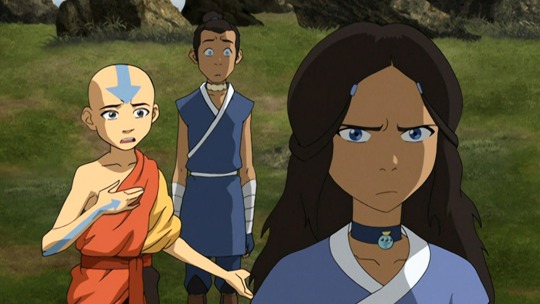
Warning: The views expressed in this analysis will be very critical of Aang. If you aren't critical of him in this episode, you aren't going to enjoy this post. This is your chance to leave. I probably won't have a debate for personal reasons.
——————
The Southern Raiders is probably one of the most discussed episodes in the fandom. Everyone knows Zuko Alone is great, but the discussion surrounding this episode is a war zone. In this essay I will try to answer every question posed in the discourse. This is part 1 out of three. In this part, I will discuss A\ang. I believe that understanding both Zuko and Aang's decisions in this episode will give us great insight into Katara's. Because the this episode is hers.
——————
1. Is Aang's philosophy of forgiveness valid?
(1) "Revenge is like a two-headed rat viper. While you watch your enemy go down, you're being poisoned yourself".
(2) "You do have a choice: forgiveness". // "It's easy to do nothing, but it's hard to forgive". // "Forgiveness is the first step you have to take to begin healing".
This philosophy is indeed morally sound. Revenge comes from rage, a negative emotion that causes harm in the long run. Forgiveness is letting go of that rage, which is healing. I cannot write a full thesis, this essay is not about that. But on paper, I do agree with A\ang. He's right to say that letting go of rage is a better alternative than getting consumed by it. (However, his philosophy might not help some).
——————
2. Was A\ang being insensitive when talking to Katara?
First I must reiterate, a lot of people frame the conflict of the episode as one regarding the ethics of murder. In my interpretation, it is not. During this episode Katara was in a deeply emotional place. Her rage stemmed from intense grief and those around her should treat her as a mourner - with great sensitivity.
Now, was Aang being this sensitive with Katara? Well, in my opinion, very much so.
Imagine a scenario where A\ang just happens to meet Haru, and he's about to go on a quest to find revenge on who imprisoned his father. He tries to help him with the following sentences:
(1) Um ... and what exactly do you think this will accomplish?
(2) Wait! Stop! I do understand. You're feeling unbelievable pain and rage. How do you think I felt about the sandbenders when they stole Appa? How do you think I felt about the Fire Nation when I found out what happened to my people?
(3) I don't think so. I think it's about getting revenge.
(4) Haru, you sound like Jet.
(5) The monks used to say that revenge is like a two-headed rat viper. While you watch your enemy go down, you're being poisoned yourself.
(6) Haru, you do have a choice: forgiveness.
(7) No, it's not. It's easy to do nothing, but it's hard to forgive.
(8) You did the right thing. Forgiveness is the first step you have to take to begin healing.
Everything makes sense, right? The pieces fit.He just talks about his cultura\personal values, nothing about what Katara needs at the moment. He could have had this exact conversation with Haru without changing a thing.
Therefore his lines are impersonal and thus preachy. In this conversation he doesn’t show signs of trying to convince Katara not to end her mother’s killer because she is, fundamentally, a good person and couldn’t live having committed murder. He shows signs of trying to make her obey his cultural ethos. This is highly insensitive. Katara was in a very emotional place, filled with rage and grief. And his response was, intentionally or not, to impose his own cultural principles onto her.
But his lines weren’t insensitive just because they were preachy, some of them were judgmental and even harsh. When A\ang is first confronted with Katara’s intentions, he says:
A\ang: Um ... and what exactly do you think this will accomplish?
You can tell from his tone and how the rest of the conversation plays out that he does know what Katara thinks this will accomplish. He asks the question as a form of disapproval - that he thinks that going after Yon Rha won’t accomplish anything. He’s not being genuine, he’s casting judgment on her. He’s almost looking down on her and Zuko, looking down from a moral high ground and sarcastically interrogating the two. Another line that sticks out is
A\ang: Katara, you sound like Jet.
He says she sounds like the man who wanted to flood an entire village full of innocent civilians. He’s insulting her, and greatly so, all the while wanting to keep a moral high ground. This is incredibly rude and condescending.
In the next scene, right after the intense argument concludes, it appears as though A\ang comes around to the journey Katara was about to go through.
A\ang: I wasn't planning to. This is a journey you need to take. You need to face this man.But when you do, please don't choose revenge. Let your anger out, and then let it go. Forgive him.
While he’s still discouraging Katara, it’s not outright condescending. But it’s as clear as day that he’d just preferred if she didn’t go on the journey at all. When he sees Zuko and Katara taking Appa to find Yon Rha, he says:
A\ang: So you were just gonna take Appa anyway?
Clearly disapproving of Katara. He doesn’t want her to go on the journey to find inner peace, he wants her to forgive the man who killed her mother right here and right now. He couldn’t change her mind on the subject, so he’ll advise her the next best thing. It is worth noting that in the beginning, before he advises her, he cracks a joke.
A\ang: It's okay, because I forgive you. [Pauses.] That give you any ideas?
Overall, A\ang’s behavior is unsympathetic and callous.Instead of placing his focus on Katara’s wellbeing, he preaches about Air Nomad teachings and goes as far as insulting her. Even when he comes around, it’s not because he realized his mistakes, it’s because he knew he couldn’t change her mind. And then he makes a humorous remark while giving him his supposed new found advice. The answer is: Yes. Aang was very insensitive when talking to Katara.
——————
3. Did A\ang know what Katara needed?
I don’t think he did. A\ang thought Katara needed to forgive Yon Rha, and as we previously established, without going after him. But even if we look at his second advice, she still doesn’t follow it.
A\ang: This is a journey you need to take. You need to face this man. [Katara situates herself on Appa's head.] But when you do, please don't choose revenge. Let your anger out, and then let it go. Forgive him.
Katara explicitly didn’t forgive Yon Rha, and yet the whole point of the ending is that she’s in a better place now. No matter what Zuko says, A\ang didn’t know what Katara needed. And considering that his lines in the episode were as impersonal as they were, it isn’t a surprise.
——————
In conclusion, A\ang’s behavior in The Southern Raiders is questionable at best. He might have had pure intentions, and had a good message, but the way he put out the message was degrading and preachy. And in the end, he didn’t know what was the right thing for Katara.
#2. taking over and becoming its own meta lol#also “katara spared yon rha bcs of ang” will be discussed in part 3#anti aang#anti kataang#zutara#<- tagging for reach#atla critical#zuko x katara#katara x zuko#anti anti zutara#pro zutara#zutara analysis#zutara evidence#zutara forever#zutara meta#zutara should have been canon#zutara nation#zutara supremacy#zutara was robbed#zutarian
57 notes
·
View notes
Text
Excuse my Zutara fangirlism but I’m on my hundredth ATLA rewatch and I just noticed another one of those scenes that could have made for PERFECT foreshadowing… it’s really crazy how this ship wrote itself in the show!
Anyways notice how Katara reacts to Jet seemingly wanting to join the gaang and Toph calling her out on it:
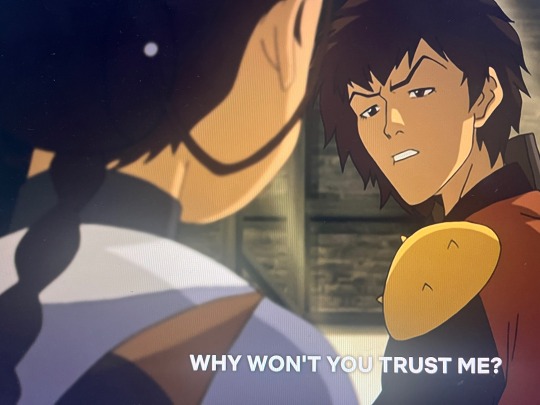

(Excuse the bad quality Netflix didn’t allow me to take screenshots bahah)
And then:
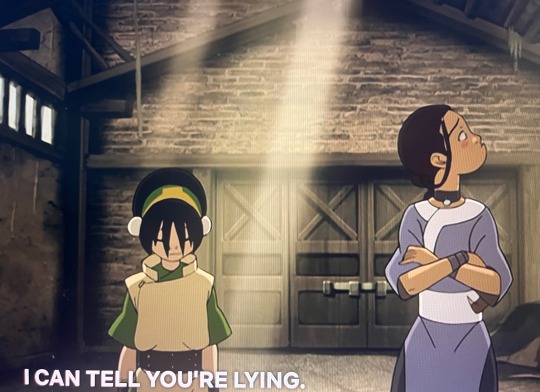
She’s blushing because she obviously had feelings for Jet, a canonical love interest of hers.
But doesn’t this scene strike you as familiar in any way…..?
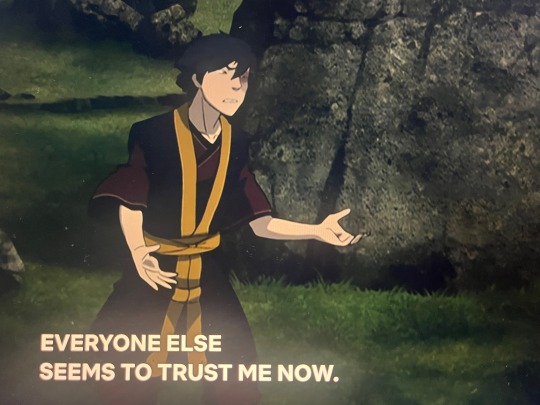

She reacted the same way with Zuko, these scenes are so identical it’s INSANE! The subtext!! *screams*

But this time Zuko is genuine and works to gain her trust back!! And then we see him risk his life for her like a couple episodes later…. AHHHHH
How are they not a canon couple again??
#zutara#Zuko x Katara#Prince Zuko#Zuko atla#Katara#katara of the southern water tribe#jet atla#zutara analysis#this ship has me in its shackles like please release me!#atla#avatar the last airbender#netflix avatar#avatar live action#natla#rambles#also the fact Jet and Zuko have similar vibes… Katara I know you was crushing baddd#Bryke tried to silence you but I know the truth#jet
624 notes
·
View notes
Text
I gotta talk about this moment even though it's been discussed a million times
Zuko, opening up to someone about his scar for the first time (from what we’ve seen in the show at least, but we can reasonably assume he hasn’t spoken about it like this since he got it) and explicitly stating that whilst he's always associated it with with failures ('the mark of the banished prince'), he's finally ready to take control and change his life for the better. And whilst he has accepted that he can never change his scar, it’s ok because he still has the power to change his destiny.
And despite this assurance, Katara, the healer, still jumps in and offers to heal it anyway, understanding that this is still a burden she could lift from him - 'What if you could be free of it?'
She knows it won't change his life in the same way taking control of his own destiny will, but still, it's like she can't help but try to ease his pain. Even if it's a pain that's long since become a permanent part of him, something that might seem surface level or cosmetic to others - 'It's a scar, it can't be healed.'
And then we have this
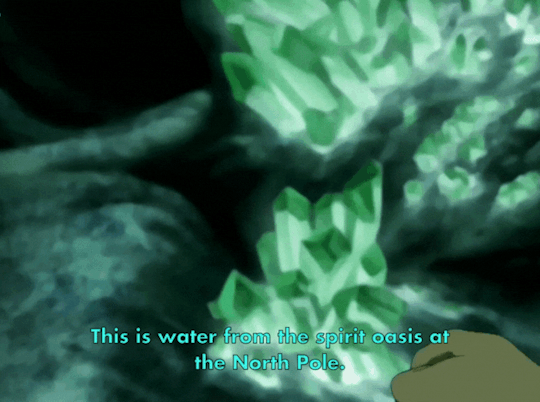

'I've been saving it for something important.'
This. Healing Zuko's scar. A wound that has, for all intents and purposes already healed and is not longer a threat to his life, but still burdens him emotionally. That has come to represent all of his trauma. This Katara considers important enough to use her limited and precious supply of spirit oasis water. In the middle of a war. In the middle of a dangerous journey to save the world in which she and her friends might be seriously injured at any time (including in this scene, where Ba sing se is literally under attack as they speak).
And if that weren't enough

'I don't know if it would work'
Now, I don't know the mechanics of spirit water in the atla universe, but it seems to be pretty heavily implied later in the episode when she uses the water to heal Aang, and for a moment thinks that it hasn't worked, that it's sort of a one-time deal.
Which means that she's willing to potentially waste the spirit water just on the off-chance that it might remove the scar. Which in the context of the wider story seems utterly insane.
But Katara thinks it's worth the risk.
And presented with this opportunity, this beautiful, selfless offer to ease his suffering, even on a purely physical, surface level, Zuko wordlessly submits, and lets her touch his scar.

Now, Katara doesn't know quite how significant this touch is (although she's very emotionally intuitive so I'm sure she has some inkling of the gravity of this action) but we do. We know that Zuko doesn't let anyone touch his scar, ever. So what this communicates to us as an audience is that Zuko is allowing himself, for the first time, to put his complete trust in someone. To be completely, 100% vulnerable with them.
And the moment of touch is all the more significant because, in many ways, it isn't even strictly necessary.
Katara's hands are empty, she isn't putting the spirit water to his face, to attempting to heal it here. And while I'd argue this touch could be a practical one - assessing the damage of the scar with her hands to see how to proceed before she uses the water - the moment after, right before they are interrupted, isn't one of practical, medical assessment, but of intimacy.
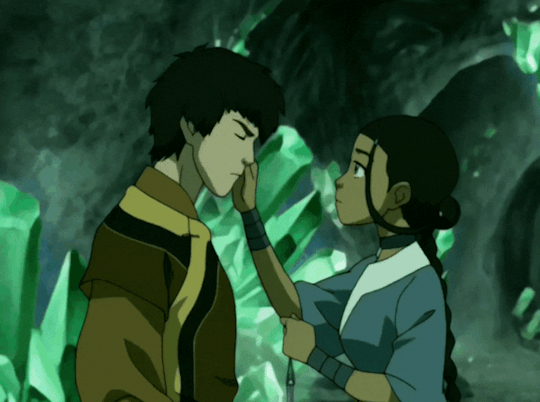
The way Zuko waits, patiently, eyes closed, and the way Katara pauses, just for a moment, doing what I can only describe as gazing at him, and that slow blink in the middle- Again, not examining his scar or reaching for the spirit water to begin, but just taking it all in.
It's so breathtakingly intimate and vulnerable - a point of connection between these two people who are supposedly so completely different but are, here, somehow so alike in their openness and understanding of one another.
That Katara offers to heal Zuko's scar even when he's said moments before that he's made his peace with the fact that he's never be free of it. And the way he accepts her offer without words because she's right, part of him does want to be free of it.
It's just an absolute masterclass in creating an immediate and powerful connection and bond between two characters in an incredibly short space of time from a start point of complete opposition without rushing it or making it seem implausible.
#I don't know how to end this is just needed to talk about this scene#they really send me into a feral frenzy#because how could this not be endgame when this scene exists???#anyway#zutara#Zuko x Katara#zutara meta#zutara analysis#my meta#atla#avatar the last airbender#my gifs
1K notes
·
View notes
Text
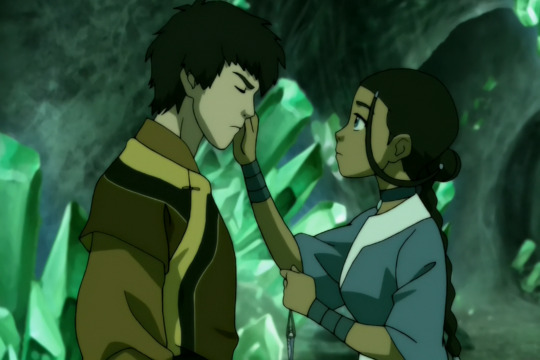
Yes, I'm here for Zutara. No one can change my mind. I've been shipping them since I was a kid, long before I knew about shipping and fandom. When I re-watch ATLA, I shipping them even more. When I watch Zutarian art and video, I shipping them even more. When I read Zutarian meta, fanfic, or headcanon, I shipping them even more. Even when I read canon shipper points, I still love and shipping Zutara even harder. I mean, just look at their chemistry! And some people still denying.
#atla zutara#zutara#anti anti zutara#pro zutara#antikataang#anti kataang#anti maiko#katara x zuko#zuko x katara#katara and zuko#zuko and katara#momtara and dadko#dadko#momtara#steambabies#zutara fanart#zutara meta#anti bryke#zutara was robbed#zutara analysis#zutara edit#zutara headcanon#zutara fandom#anti zukka#zk
200 notes
·
View notes
Note
what’s your take on zutara being “you’re the wind, i’m in the water”. i’ve heard k@t@@ngs saying it’s clearly about their ship bc their elements are air and water but isn’t that a very surface level of understanding of the lyrics?
anon, i adore you for this ask because i love chemtrails over the country club (and lana's music in general).
i'm not surprised that people would try to apply this song to katara and aang because yes, at a surface level it's relevant to them for obvious reasons (water vs. wind), but i agree that the lyrics have far more depth than this.
first, we have to look at the context of the lyrics within the song. "you're in the wind, i'm in the water" presents a romanticized view of the separation of two lovers, just as the two elements brush past each other but never become one. this theme of separation is seen throughout the rest of the song as lana contrasts the privileged bubble of suburbia with the harsh reality of society, the darkness lurking behind a beautiful front.
likewise, zuko and katara have similar character arcs that revolve around an awakening to the harsh truths of society. zuko learns that the beauty and the power of the fire nation is just a facade, hiding the extreme cruelty of its colonialism and imperalism that has hurt all people (which goes hand-in-hand with zuko unlearning the abuse from his father, the personification of the fire nation itself). katara's arc involves a similar type of awakening, as she unlearns some of the dichotomous thinking she's held around the fire nation. her experiences with jet, hama, the sexism of the northern water tribe, the fire nation village in the painted lady, and even zuko show her the complexities of the war and teach her that people aren't always as simple as "good" or "evil." essentially, both zuko and katara undergo parallel character arcs that fundamentally change their worldview, reflective of the theme of chemtrails over the country club.
additionally, the "wind" and "water" that symbolize the separation of the two lovers in the song is also reminiscent of zuko and katara's journey - the two characters that have been pitted against each other from the beginning of the show, their opposing goals of protecting the avatar vs. capturing the avatar, daughter of the chieftain of the southern water tribe vs. prince of the fire nation, and the two characters that end every season finale in an climactic fight scene (first on opposing sides, then on the same side). and if you want an even more bittersweet perspective, there's also the fact that they are doomed by the narrative, two lovers who never end up together in this lifetime, fated to be separated.
if we want to look further into the song, i've also seen the lyric "nobody's son, nobody's daughter" being superficially applied to aang and katara as they have both experienced loss, but again, in the context of the actual show, it's katara and zuko who are repeatedly paralleled with this connection of losing their mothers and being separated from their fathers. katara discusses her grief over losing kya with haru, jet, and aang, but it's only her and zuko's connection over this that carries actual narrative weight in the story. and katara is the only person that zuko discusses the loss of his mother with. so it only makes sense that all of these narrative parallels culminate in the southern raiders, an episode vital to katara's character arc in which zuko is a crucial supporting character. you could also argue this ties in with the overall theme of separation in the song - being separated from your parentage and having to forge your own path.
finally, as a fun little addition, one of the other lyrics in the song is "my moon's in leo, my cancer is sun." and hmm, who are the two characters we typically associate with the moon and sun? (hint: "you rise with the moon, i rise with the sun"). but wait - it goes even deeper than that. i am most definitely not an expert on zodiac signs, but according to some basic googling, leo (a fire element) is typically ruled by the sun, while cancer (a water element) is typically ruled by the moon. by switching up what elements we typically associate with the signs, lana is reflecting on the duality and the unpredictability of herself like how she reflects on the duality of society earlier in the song. and similarly, zuko and katara undergo dual character arcs bound by elemental symbolism. despite being a waterbender, katara also personifies the element of fire - the element of passion, power, and will - as she stands up against injustice and refuses to back down from a fight. and despite being a firebender, zuko's arc also personifies the element of water - the element of change and adaptability - as zuko's perception of himself, his father, and the fire nation changes over time. they are both water and fire, both moon and sun, both yin and yang.
#zutara#zuko x katara#zutara analysis#atla#my post#my meta#anti kataang#kataang critical#my asks#i'm sorry this took so long to answer anon!#writing this post almost convinced me lana wrote this song for zutara#i think it just goes to show how well written zuko and katara's parallel character arcs were#i've seen many a tiktok bashing zutara shippers for posting zuko and katara to these lyrics and arguing that k//ataang fits better#and ugh... it's just such a superficial analysis to compare just based on the elements of wind and water
50 notes
·
View notes
Text
Why Katara's Acts of Kindness towards Zuko differ from others
I recently received a reply on one of my posts where I stated that Katara was the first person (besides Iroh) to show Zuko genuine kindness and compassion, in the 'Crossroads of Destiny' when they were down in the Crystal Catacombs.
The comment state that Aang was the first person to show Zuko humanity (Episode 13, The Blue Spirit; Episode 20, The Siege of the North, Pt.2) and even brought up other characters that we see throughout Zuko's journey such as: Song and Jin.
And whilst yes, these characters did show Zuko concern, care and warmth, it differs greatly to Katara's own.
Let's begin with Aang:
Aang's character is motivated and driven by the Air Nomad teachings, philosophy and morals and one of his core principles that he follows is "all life is sacred'. In 'The Siege of the North, Pt.2' - he saves Zuko because he cannot allow another living being to die, especially when he can prevent it by simply saving him from the winter cold. It's part of Aang to save people - no matter how much wrong they've done.
In 'The Blue Spirit' - Aang once again saves Zuko - and not only because of his moral compass because Zuko had saved Aang from Zhao. They have a moment to talk once Zuko awakes, and Aang questions if had the circumstances were different between them, could they have become friends. Aang, in this part of the story, is very childish and believes that everyone has good to them; he's also someone that seeks friendship and attention - and it plays into his character that, as he mourns his lost friend Kuzon, he thinks of a potential friendship with another firebender: Zuko.
So Aang's compassion and kindness comes from a place of morality and of loss.
With Jin and Song - I won't reflect too much on their acts of kindness given that, in that moment of Zuko's journey, he was secluding his true identity. In both of these womens' perspective, Zuko wasn't the Fire Nation Prince. He was Lee, an earth kingdom refugee, a victim of the war, someone like them. Had they known Zuko was a member of Fire Nation Royalty, I'm certain their reception wouldn't unfold as it did.
Now with Katara...
Katara knows Zuko. To Katara, Zuko is the face of the enemy, the face of the opposing side of the war, the face of evil. In that precise moment, Katara had her mother's necklace "stolen" by him; had her home ambushed by his fleet and her grandmother threatened by his very hands; she'd been chased down by him and they had fought multiple times before. They relationship at that point is hostile, fueled by hatred.
And Katara is also a character that doesn't forgive quickly. Unlike Aang, Katara doesn't follow the same moral compass and she doesn't seek out friendship in the enemy that took her mother; the enemy that led her Father to fighting in the war and abandoning his children; the enemy that tried time and time again to kidnap/burn/kill her friend and the Avatar... Katara's unforgiving with Zuko because:
Katara: It's just that for so long now, whenever I would imagine the face of the enemy, it was your face.
Yet, despite all that, when Zuko reveals his loss and empathizes with Katara's own loss of her mother; once he reveals himself more vulnerable, small and defenseless than he has ever been before... Katara shows him compassion, apologizes for her outburst and offers to heal Zuko's scar. Because, though it's in Katara's nature to hold a grudge towards the enemy, it's not in Katara's nature to hate blindly. She's a caring, loving and patient person - and she quickly shows Zuko all those attributes.
It's the first moment in the story that Zuko has received unadulterated humanity and sincerity (despite all the hurt he'd brought to Katara and her friends).
Katara was the first person to forgive Zuko. It was the first glimpse into the start of his destiny to bring honor and forgiveness towards the Fire Nation.
And that is why I believe that Katara and Zuko's destinies were linked to one another. Katara would have never dispelled the demons and trauma of her past had Zuko not aided her in searching for Yon Rha; And Zuko would have never become Fire Lord and uphold his responsibilities and destiny - had Katara not fought beside him and showed him that he could be forgiven.
#zutara#zutara long post#zutara analysis#anti kataang#anti bryke#does this even make sense#I ramble a lot and sometimes that means my ideas don't stick or my points don't connect#hopefully I get the general idea across#IDK man#I just love Zutara's connection and relationship
282 notes
·
View notes
Text
It’s really funny how much people misremember certain aspects of ATLA and then proclaim to the internet stuff that either never happened or is extremely distorted with absolute certainty. For example, today I saw a person claiming that whole point of Katara’s character arc was unlearning the parentified behaviours she developed in wake of her mother’s death. That a huge part of Katara’s arc was a confrontation of how that trauma fundamentally shaped her maternal tendencies.
The thing is though…WE the audience, can recognize that the parentification Katara experienced was something that was really straining for her, but the TEXT doesn’t. The audience (or at least certain parts of the audience) can identify that her maternal tendencies were indicative of a responsibility that she took on far too young and subjected her to unnecessary pressure and stress. There are flashes of recognition maybe, but for the most part, the show doesn’t actually confront the negative impact that Katara’s maternal role had on her.
Katara never truly unlearns the maternal behaviours that put so much pressure on her because the text doesn’t see it as a bad thing. Arguably, the text doesn’t see much of a problem with the emotional labour Katara takes on and how that labour goes unreciprocated for the most part (particularly from her canon love interest). We see some reflections, but it’s not enough to support a reading of the text where that element is actually extremely obvious and a prominent point in her character arc.
We’re not the ones “watching the show with our eyes closed”, I think you’re just misremembering the canon progression of Katara’s arc to avoid confronting a real issue in the text.
#Katara#pro katara#avatar the last airbender#atla fandom critical#atla discourse#the gaang#character analysis#atla fandom discourse#zutara#atla critical#anti bryke
433 notes
·
View notes
Text
Katara and Mutuality in Relationships
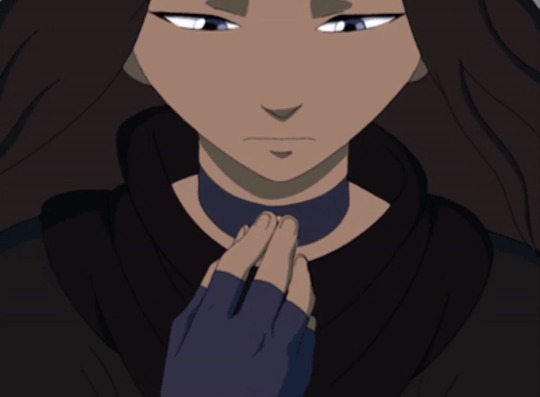
There are lots of conflicting opinions about which characters Katara felt attraction towards, which characters she didn’t, and how long she felt that attraction. I see in most cases, people point to quick clips of her faintly blushing or kissing another character on the cheek as evidence, but I think these kind of takes miss the nuance of the purpose attraction serves in a story.
Most importantly, I see these characters treated as if they are actually people capable of making their own decisions. It’s important to remember that these are fictional characters. They don’t make their own choices; the writers make their choices for them for the purpose of telling a story. From that standpoint, it’s more valuable to examine how a character’s story and narrative themes tie into their relationships with other characters. Animators can shove in a kiss or a blush wherever they want, but it’s harder to demonstrate through storytelling how and why two characters might feel attraction towards one another, and how a relationship between them would develop both characters and contribute to the overarching themes of the story.
In other words, when discussing which characters Katara is “attracted” to, I’m discussing which relationships and actions within the narrative build on her established story and arc. Romance is always integrated into a story for a reason, and considering that reason is important.
Unfortunately, ATLA is very much a product of its time in this way. It’s easy to see what romance adds to the arcs of the male characters—but not so much with the female characters. All three canon relationships (kataang, sukka, and maiko) follow this trend to some degree. The primary purpose of the woman in this narrative is to act as a prize for the man for performing some good deed. Once they’re together, she ceases having her own motivations and becomes an extension of the male character she’s dating. This is pretty blatant with Suki—she barely had a personality in that later seasons; she is there to be Sokka’s girlfriend. Similarly, Katara becomes a completely different character—she’s even animated differently—when the narrative pushes her into romantic scenes with Aang. Her character is flattened.
So what is Katara’s arc, and how do the romantic interactions she has throughout the series contribute to this?
Well, that could be a whole other essay itself, but to put it simply, Katara’s arc is one of a young girl devastated by grief at a young age clinging to hope that she has the power to fight and change the world for the better. Which she does as she gains power and confidence throughout the series—culminating in her defeating Azula in the finale.
But the part I want to focus on here is how Katara connects with other characters. She connects with them over shared experiences of grief and loss.
Take Haru, for instance.
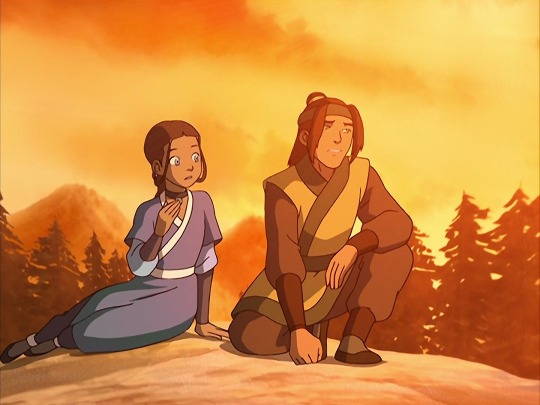
Haru: After the attack, they rounded up my father and every other earthbender, and took them away. We haven't seen them since.
Katara: So that's why you hide your earthbending.
Haru: Yeah. Problem is…the only way I can feel close to my father now is when I practice my bending. He taught me everything I know.
Katara: See this necklace? My mother gave it to me.
Haru: It’s beautiful.
Katara: I lost my mother in a Fire Nation raid. This necklace is all I have left of her.
Haru: It’s not enough, is it?
Katara: No.
This isn’t just a throwaway moment; it’s an important character moment that leads up to growth and the progression of Katara’s overall story, both in this individual episode and in the whole series.
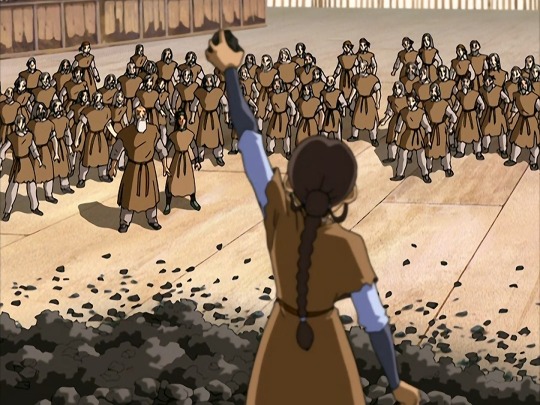
Katara finds her power in the connections she’s able to make with other characters. It’s a powerful driving force for her that makes her a strong character even before her bending abilities develop. Imprisoned was such an important episode to establish who Katara is and what her power is, and adds so much to her arc.
But there is one line in particular from the above exchange that also stands out: Haru says “it’s not enough, is it?” and Katara agrees. Even this early in the series, we’re establishing the fact that despite her drive and hopeful outlook, Katara feels deeply hurt, she feels a deep sense of loss that she opens up about to other characters in moments like these. But unlike Haru…Katara can’t go rescue her mother. Her mother is dead, and we see her grapple with that grief throughout the series.
Another character she reaches out to like this is Jet.
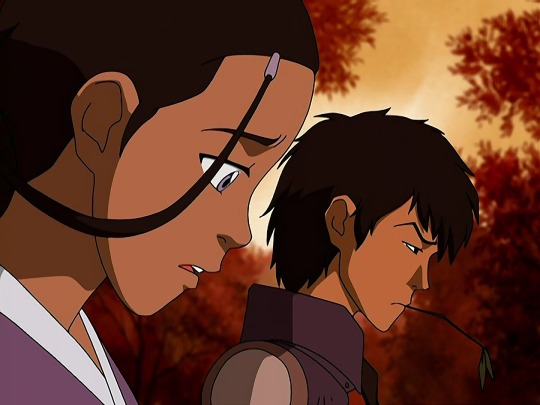
Jet: Longshot over there? His town got burned down by the Fire Nation. And we found The Duke trying to steal our food. I don't think he ever really had a home.
Katara: What about you?
Jet: The Fire Nation killed my parents. I was only eight years old. That day changed me forever.
Katara: Sokka and I lost our mother to the Fire Nation.
Jet: I’m so sorry, Katara.
Another important note about Jet is that there are explicit romantic feelings from Katara in this episode. Again, Katara empathizes with another character through a shared sense of loss. Sadly, in this case, Jet manipulated her feelings and tricked her into helping in his plot to flood the village…but those feelings were undeniably there.
That was the tragedy in this episode, but it also gives the audience so much information about Katara as a character: what motivates her, and what she wants. Katara is established as a character who wants someone who will connect with her and empathize with her over her loss—her greatest sense of trauma. She wants to help others but also receive support in return. The reason why she was smitten with Jet, beyond just initial attraction, is because he gave her a sense of that before Katara realized his true motivations.
A lot of people make the claim that Aang is good for Katara because he also feels a sense of great loss and trauma. And while on paper that’s true…does he really demonstrate that? I just gave two examples of characters Katara connected with this way, and both responded with deep empathy to what she said. Very early on in the show—the third episode—Katara attempts to connect with Aang the same way. How does he respond?
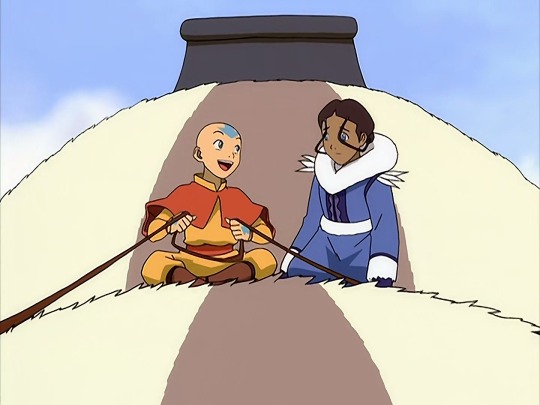
Katara: Aang, before we get to the temple, I want to talk to you about the airbenders.
Aang: What about 'em?
Katara: Well, I just want you to be prepared for what you might see. The Fire Nation is ruthless. They killed my mother, and they could have done the same to your people.
Aang: Just because no one has seen an airbender, doesn't mean the Fire Nation killed them all. They probably escaped!
Just compare this exchange to Haru and Jet. No effort to empathize, not even a “sorry for your loss” or anything. It’s a stark contrast, and the reason for that is because this narrative entirely centers Aang. Katara’s narrative always seems to be secondary to his when they’re together—which is exactly my point when I say this relationship has a fundamental lack of mutuality. It’s built that way from the beginning of the series. It does not add to Katara’s arc nor establish what about this dynamic would attract her.
And, look, before someone jumps down my throat about this…I’m not saying Aang is a horrible person for this response. I think it’s a sign that he’s immature and has a fundamentally different approach to problems than Katara. Katara is a character who has been forced to take on responsibilities beyond her years due to being a child of a war-torn world. Aang’s approach to problems is avoidance while Katara never had that luxury. It doesn’t mesh well.
This is all in Book 1. I honestly could have gotten on board with Kataang if the series meaningfully addressed these issues…but it didn’t. In fact, they actually got worse in some ways.
Back to Katara’s mother. We’ve established that this is a core part of Katara’s character and like in the scene with Haru, she indicates that this is an unresolved issue that pains her. But then, in Book 3, Katara actually does get a chance to confront this pain.
This would have been a powerful moment. Surely the character who is meant to be her partner, her equal, would have been there for her. Surely he would have understood and supported her, fulfilling her narrative and adding to her story.
But Aang didn’t do that. I won’t go into details because there are a million analyses out there on The Southern Raiders, but Aang’s response to Katara was the opposite of understanding. He got angry with her, insinuated that she was a monster for wanting revenge, and tried to dictate her behavior according to his own moral values. And importantly, from a narrative standpoint, he did not go with Katara. One of the most important events in her arc, and Aang didn’t support her—he actually tried stopping her. He didn’t contribute to her growth and development.
Also noteworthy:
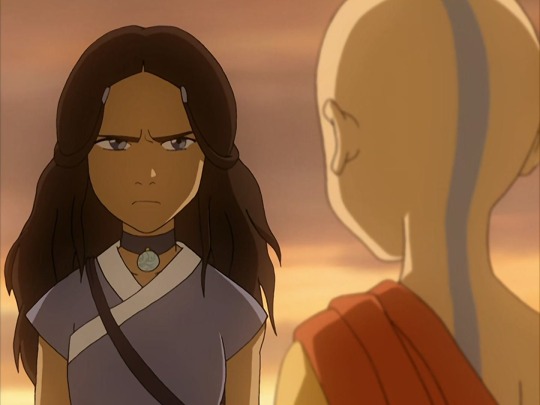
Katara: But I didn’t forgive him. I’ll never forgive him.
Even at the end of the episode, Aang clearly doesn’t understand at all what Katara is feeling. This line demonstrates it perfectly. He thinks she forgave him when that wasn’t the case at all…but of course, he didn’t even accompany her, so he didn’t see what actually took place. His worldview is fundamentally different from hers, and he’s consistently too rigid in his morality and immature to center Katara’s feelings.
Throughout Katara’s whole arc, her most significant character moments, Aang’s character just doesn’t come through the way Katara’s constantly does for him. Their narrative lacks mutuality. When Katara and Aang are together, she becomes an accessory to him. The ending scene is a perfect demonstration of this.
Now, to address the elephant in the room.
Which character does actually add to Katara’s narrative and support her growth as a character?
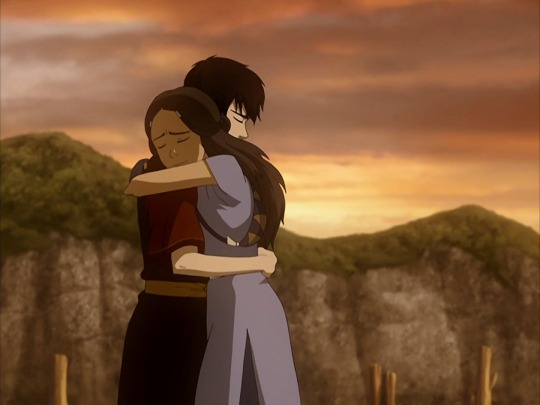
Correct! I just talked about how important The Southern Raiders is to Katara’s character and story, how it’s a chance for her to finally address the grief she’s been carrying since Book 1. And who stood by her side throughout this pivotal moment? Right—Zuko did.
You can talk all you want about how he’s a “colonizer” while Aang’s people suffered genocide, but you’re forgetting that “show, don’t tell” is one of the most basic aspects of storytelling. The fact is, despite how it looks on paper, Zuko was the one there for Katara at her critical moments. Zuko empathized with Katara more than Aang ever did—as demonstrated in this episode. Zuko never once brought up his own cultural values. Zuko never once told Katara what to do. Zuko’s position was that Katara should be the one to decide, and that he would support any choice she made. He supported her decision to spare Yon Rha, but he would have also supported her if she decided to kill him. I actually found this episode to be a satisfying reversal to what is typically seen in TV—for once, the female character is centered while her male counterpart takes the backseat and becomes a supporting role to her narrative.
Even before this, Zuko is shown to empathize with Katara.
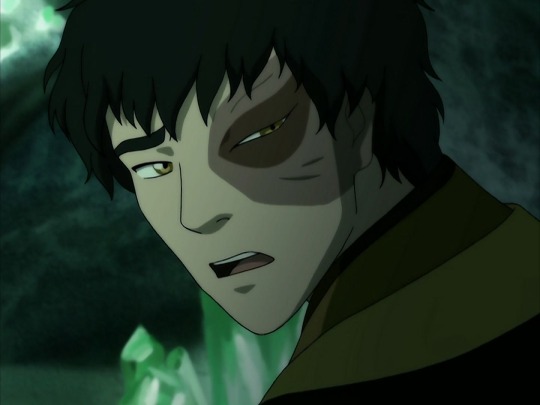
Zuko: I’m sorry. That’s something we have in common.
I think what gets me about this scene is the fact that he’s still Katara’s enemy, and she was just yelling about how she hates him and his people. But despite that, Zuko still empathizes with Katara. She is fundamentally human to him, and he expresses that to her in a way that allows them to connect. Zuko stands to gain nothing from this. It’s true that Azula entered the picture and twisted things around—but in this moment, Zuko’s compassion is genuine. His instinct was to respond to her grief with empathy, just like she consistently does for other characters.
And finally, how else does Zuko add to Katara’s arc?
I don’t think there is any more perfect of an example than the finale itself—the culmination of the arcs and development of all characters.
Zuko and Katara fight together. In a heartbeat, Zuko asks Katara to fight by his side against Azula, because he trusts her strength. She’s his equal—both in his mind, and in a narrative sense.
Then, this:
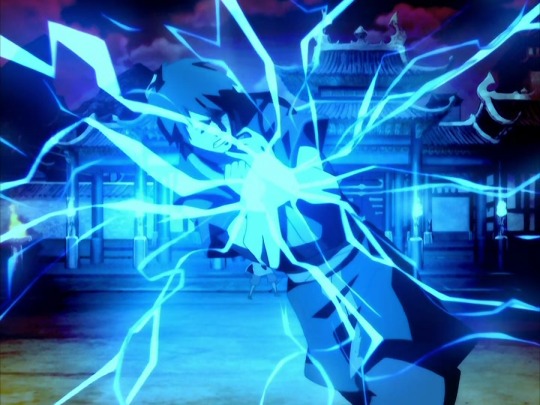
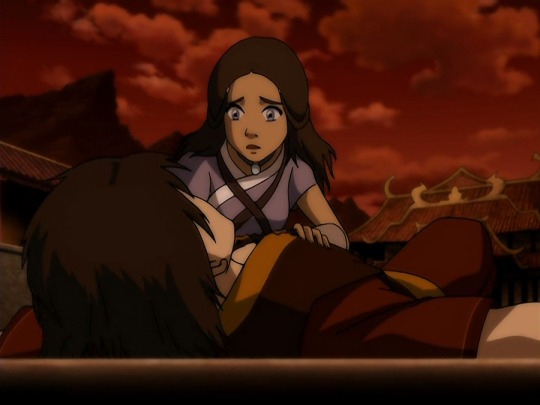
Both of their roles are so critical in this fight. They both save each other. The scene has such raw emotion to it. These characters were together at the conclusion of their respective arcs for a reason.
This is the perfect conclusion to Katara’s arc. She just played a critical role in ending the war that has caused her trauma her whole life. She just demonstrated her mastery of waterbending (another thing she’s dreamed of throughout the series) by defeating the world’s most powerful firebender during Sozin’s Comet. Even though she had help as all characters do, these are victories that belong to her and demonstrate the growth and power of her character. And to top it all off? She was able to save Zuko’s life. She didn’t have to endure the pain of feeling helpless to do anything while someone else died for her; this time, she had an active role, she changed her fate, and she prevailed. Zuko plays an important role in Katara’s story without dominating it. They perfectly represent mutuality. They add to each other’s stories. Their narratives become stronger when they’re together, without one diminishing or sidelining the other.
So, from that standpoint, that’s why I always see the attraction between Zuko and Katara and why I see it lacking between Aang and Katara. Zuko and Katara’s story doesn’t need some cheap little throwaway moments to shine. It’s integral to both characters’ stories. We are shown not told of the way these characters feel about each other. Given everything we know about Katara, her goals, her values, her past loves…absolutely everything points to Zuko being the true subject of her feelings.
Because let’s be honest. The ending I just described is so much more powerful and so much more Katara than seeing her being relegated back to a doe-eyed love interest for Aang to kiss. It hardly even made sense—Katara played no role at all at the culmination of Aang’s arc. She was relegated back to a love interest, rather than the powerful figure we saw fight alongside Zuko.
#zutara#katara#zuko#atla#anti kataang#canon critical#jet#haru#katara deserved better#aang critical#meta#analysis
397 notes
·
View notes
Text
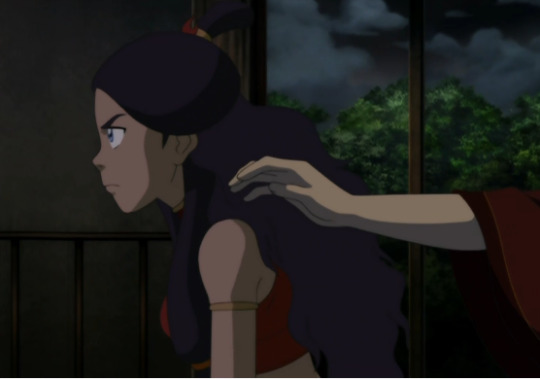
About this event - this is the last time Katara and Aang interact before Ozai is defeated right? Then this was supposed to be the culmination of the interaction between their character arcs - Katara finally lets Aang go, stops trying to shield him from things he has to see or do.
It's just that this event feels so underwhelming precisely because it's overlapping with a zutara moment - and in the tierlist of zutara moments, this particular one is Just Another Tuesday; even one like this overshadows the penultimate Aang-Katara interaction and that's caught me by surprise. It took me till now to realize this moment was supposed to conclude Aang-Katara interactions in the show.

I think the whole season 3 was pretty scruffed and crumpled, but there really should have been a bigger emphasis on the resolution if the show wanted to keep the relationship between Katara and Aang a significant thread, and I'm not even talking about the romantic attempt.
#what I'm saying is that the whole ending of S3 feels like “sabotage” (in a funny way)#that actively works against KA#which is still a bit hard to believe but it's true#zutara#analysis
239 notes
·
View notes
Text
Accidentally glanced at an anti post and apparently zutarians analyzing the show is annoying now. Antis are literally ridiculous I can't even.
#analysis is part of being in a fandom sorry#like you don't have to engage with it but its ridiculous to say that giving reasons for shipping something is “annoying”#atla#avatar the last airbender#zutara#anti kataang#anti anti zutara
191 notes
·
View notes
Text

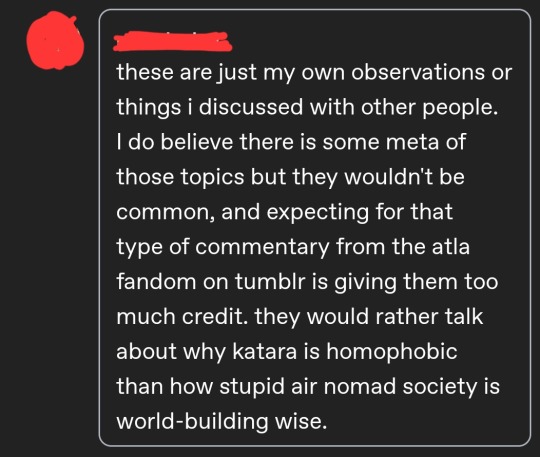
This is why I prefer to let other people take the mic when it comes to fandom/moral critique. Even on my best day, I couldn't publish a fandom-critical take half as comprehensive and coherent as this one.
Reposted anonymously with permission from OP, who understandably does not want to deal with hate comments/hate asks for expressing these opinions.
(Hopefully the screenshots load properly on tumblr, I know the first one is incredibly long 😅)
#zutara discourse#anti anti zutara#the colonizer argument#fandom analysis#anti purity culture#anti ship war#anti kataang#anti maiko#anti aang#anti mai
187 notes
·
View notes
Text
My Interpetation of The Southern Raiders: Part 2 – Zuko
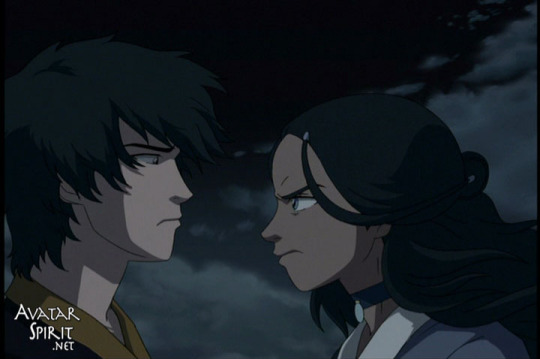
Warning: The views expressed in this analysis will be somewhat uncritical of Zuko. If you aren't likely to agree, you aren't going to enjoy this post. This is your chance to leave. I probably won't have a debate for personal reasons.
——————
This is the second part out of a three part series trying to answer every question posed by the discourse on The Southern Raiders. If I take some things for granted, it's because I discussed them in part 1, in which I delve into A\ang's role in the episode. Today, I'll set my sights on Zuko.
——————
1. Was Zuko a negative influence on Katara?
No, he did not. When Zuko merely presents the possibility of tracking her mother’s killer, it cuts through her reply right to her already leaving. In literature, what isn’t in the text holds no relevance and is to be disregarded as mere speculation. We don’t see Zuko convincing her, therefore he had no influence on her, and that she made the choices she did because she wanted to.
All Zuko did later on was defend a decision Katara already made on her own. And in both the first and second disagreements with Aang she had the last word. Ergo she was making her own choice.
Additionally, before they enter the room of who they think was her mother’s killer, Zuko asks her if she’s ready. And when she finally spares Yon Rha, he supports her decision. If he were to influence her, he wouldn’t have done either of these things. He only wanted to help Katara heal and never brought up anything that wasn’t already there.
——————
2. Was Zuko being too harsh on Aang?
(1) That's cute, but this isn't air temple preschool. It's the real world.
(2) [Forgiveness]'s the same as doing nothing!
(3) Okay, we'll be sure to do that, guru goody-goody.
He was definitely disrespectful towards Aang's culture, although his disrespectful remarks are a response to Aang’s own disrespect, imposing his beliefs onto Katara. And he didn’t say that until after Aang compared Katara to Jet. It was still wrong to come after the Air Nomad teachings, but they’re not as insulting as people paint them to be.
And it’s not like he didn’t take them back by the end of the episode. Zuko had good intentions, made a mistake and learned from it. That’s how characters grow, through mistakes. (More on that later).
——————
3. What motivated Zuko to find Yon Rah?
He wanted to earn Katara’s trust. The show makes it explicitly clear.
Zuko: What can I do to make it up to you?
And so later:
Zuko: Katara mentioned it before when we were imprisoned together in Ba Sing Se, and again just now when she was yelling at me. I think somehow she's connected her anger at that to her anger at me.
I’ve seen many describe this motive as selfish or manipulative, but I have to disagree. He has no reason to do anything to earn Katara’s trust. He saved her life on that very day, is fully accepted into the GAang, and in this episode he found out that some of her anger at him is rooted in projection. But he still goes out of his way to do the impossible, to give Katara the closure she needs in order to put faith in him.
——————
4. Why did Zuko think revenge\murder would help Katara?
Katara is a kind soul and murder wouldn’t have helped her heal, but Zuko had good reasons to think it would have. He didn’t know Katara’s soul, she didn’t even consider him a colleague, at that point she hated him. However, he did see Sokka killing Combustion Man in The Western Air Temple. So he has no way of knowing whether revenge would help, but he’s under the impression that murder isn’t a big taboo at least for some of the GAang.
Moreover, he knows that the person who took his mother away from him will receive justice, and that it helps him sleep at night. Katara doesn’t have that, Yon Rha retired in peace. So he offers her the justice he knows helps him.
But the main reason why he thinks revenge would help Katara, is that she told him it will. Zuko plays a largely passive role in the episode, simply assisting Katara in whatever way he can.He’s only fulfilling Katara’s wishes, and she told him that her wish is to seek justice on “the monster”.
——————
5. Did the trip have an effect on Zuko?
It did. By the end of the episode, Zuko delivers the following line:
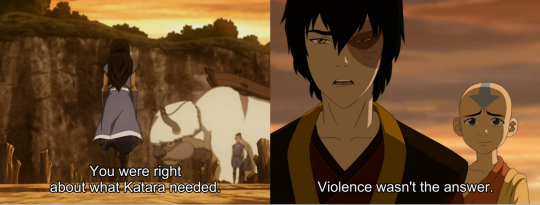
This is an important part of his arc of unlearning the Fire Nation’s black and white philosophy that values aggression above all else. He comes around to Air Nomad pacifism and non violent solutions from seeing them work first hand. And as the good (redeemed) person that he is, he admits he was wrong and changes his views. He grew as a character to become a better version of himself.
——————
In conclusion, despite the somewhat questionable nature of Zuko's actions in "The Southern Raiders", his underlying good intentions shine through. His role was not a devil on Katara’s shoulder, but a natural force backing up whatever decision she makes. And this allows him to emerge with a valuable lesson learned.
#can't believe i wrote this so fast#wow#zutara#zuko x katara#anti kataang#katara x zuko#zukoxkatara#kataraxzuko#pro zutara#pro zuko#zuko#anti anti zutara#zutara analysis#zutara evidence#zutara forever#zutara meta#zutara nation#zutara should have been canon#zutara was robbed
32 notes
·
View notes
Text
I don't ship Zutara that much but M*!k0 shippers who call it "colonizer x colonized" actually annoy me so badly 💀they literally undermine Zuko's whole ass arc and growth just bc they dislike Zutara then reduce him to some idiot colonizer as if he never had literally the best growth in the series. His whole arc is about NOT BECOMING a colonizer. How tf are you going to say that just bc you dislike Zutara when his whole arc is about becoming the opposite of a colonizer and even getting full on episodes of him getting Katara's forgiveness. You're literally taking away all of Zuko's growth, suffering, and development. 💀M*!k0 shippers are actually so dumb like why are you even defending that badly written ship lmao
#anti maiko#maiko anti#zuko x mai anti#zutara#analysis#anime#anime analysis#my meta#meta#atla meta#avatar#atla#avatar the last airbender#media literacy#avatar aang#zuko#katara#pro zuko#pro katara#prince zuko#not a big zutara person but seeing maiko shippers call zuko a colonizer just to upscale maiko literally baffles me like are you illiterate
151 notes
·
View notes
Text

something something fire and water are opposites… something about air and earth being opposites… something about moon and sun, and an earthbender appearing to an airbender in a place of strong spiritual connection… something or such about waterbending techniques being used to create new unique firebending maneuvers… oh yes something about age and maturity in relation to peers… sometimes in regards to push and pull… or maybe equal and opposite action and reaction and how balance in all things (especially the elements) is always needed and as such is a primary reason for the avatar’s existence… mmhhh yes yes
#atla#zutara#taang#avatar the last airbender#zuko#katara#aang#toph#toph beifong#fire lord zuko#avatar aang#master katara#aang x toph#zuko x katara#atla netflix#avatar netflix#atla meta#atla discourse#atla analysis#atla live action#atla live action tv show
184 notes
·
View notes
Text
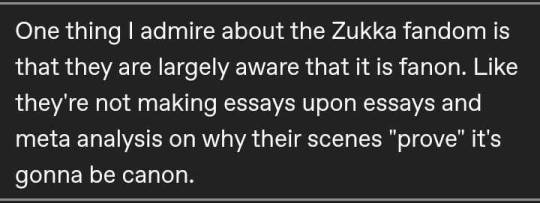
This post quite funny to me.
No offense for Zvkka fandom, but there's a reason why this ship don't have a lot of essays and meta analysis even though it's popular. This ship exist just for fun, nothing more than that.
Essays and meta analysis not really necessary because this ship has no evidence whatsoever that it will become canon. Like, what do you want to proof if it's just two random characters you ship?
In case of Zutara (because it seems like this post is satirizing Zutara, or maybe not), I think all Zutaran are aware that Zutara just fanon and we ship Zutara just for fun too. But, we also have many reason why we stand with this ship, not only they looks good together.
Essays and meta-analysis make our reasons valid, while we put proofs from the show because we're not making this up. Beside, even some ATLA writers fought for Zutara. Apparently, that's not the case with other fanon ships in ATLA, moreover Zvkka.
Well, it's not our fault that Zutara have a lot of materials to to confirm our argument.
#anti zukka#zutara#pro zutara#anti anti zutara#zuko and katara#atla zutara#zutara meta#zutara analysis
96 notes
·
View notes
Text
Katara's Legacy in LOK: "Healer Wife of the Avatar" (part I)
I only recently finished watching all of The Legend of Korra from start to finish. Based on the analyses I’ve read from the time the show was airing, there seemed to be a decent amount of backlash against how the adult gaang was portrayed - particularly Katara. LOK’s fanbase has grown since then, though, especially during the 2020 renaissance, and I was surprised by how many recent positive comments I’ve seen from fans on Katara’s role.
Because if you paid attention at all to Katara’s characterization compared to Aang, Sokka, Toph, and Zuko, it’s clear just how much Legend of Korra has tarnished her “legacy” or lack thereof.
I will be splitting this analysis of lok!Katara into two parts:
First, I will break down her portrayal in the show compared to the other members of the gaang to demonstrate how Katara received the worst treatment from the writers. Though I did have problems with the other characters’ portrayals as well, I don't have time to discuss them in-depth in this post. Then, I will counter common arguments used in defense of lok!Katara’s portrayal on the grounds that they do not provide an adequate in-universe explanation for her character’s drastic change from ATLA.
For part 1, I decided to examine everything we know about the gaang after the original series only based on the information provided via Legend of Korra (excluding poor Suki, who is never mentioned at all). For each character, I will answer the question “What do we know about [character] based solely on their role in Legend of Korra?”
Sokka

Assuming we have never watched ATLA before, what do we know about Sokka based on LOK?
Well-respected for his wisdom and leadership, as he was Chief of the Southern Water Tribe, a councilman in Republic City (Representative of the Southern Water Tribe), and the chairman of the United Republic Council
Played a significant role in Yakone’s bloodbending trial - moderated the Council’s deliberations and announced their decision to find Yakone guilty
Worked together with other political/military leaders - Zuko, Tenzin, and Tonraq - to protect Avatar Korra by designing prisons for Red Lotus members that would be impervious to their bending
Toph mentioned they were friends in their youth, describing a time he was stuck in a hole when she was trying to teach Aang earthbending
Sokka, Toph, and Aang seemed to have remained friends into adulthood as they all worked together to defeat Yakone
Fond of his trusty boomerang, which he claimed to have used to win a fight against a man with combustion abilities
Due to his achievements, has a statue built in his honor in front of the Southern Water Tribe Cultural Center in Republic City
Zuko
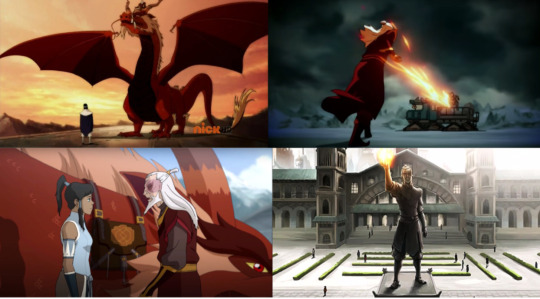
Assuming we have never watched ATLA before, what do we know about Zuko based on LOK?
Former Fire Lord and co-founder of the United Republic, who worked with Avatar Aang after the 100 years war to transform the Fire Nation colonies into the United Republic of Nations
Zuko and Avatar Aang had a rocky start, as Zuko described a time when he once hired a man with combustion abilities to kill Aang in his youth, but they eventually became close friends
Acted as Aang’s counsel and was described as being the person who knew Aang better than everyone else, leading Korra to turn to him for advice
Good friends with the Southern Water Tribe - worked with Sokka, Tonraq, and Tenzin to imprison Red Lotus members that wanted to kidnap Korra, specifically working with Unalaq and Tonraq to build a prison to hold P’Li
Years later, continued to work against the Red Lotus when they broke out of prison
Investigated the prison break of Ming-Hua, sent word to Lin Beifong to protect Korra, then flew off on his dragon to stop the Red Lotus from breaking P’Li out of prison
Fought Ghazan using his firebending during the Red Lotus break-in
Discussed the Red Lotus situation with Lin, Korra, and the others, before leaving early on Druk (his dragon) to return to the Fire Nation and protect his family
Despite being in “retirement,” remains an active participant in international relations - makes appearances as Prince Wu’s coronation and Jinora’s airbending master ceremony, along with engaging in discussions with President Raiko, Tenzin, and Tonraq about the future of the Red Lotus after Zaheer was imprisoned again
Highly respected and honored for his achievements - Bolin and Mako were impressed to meet him, statue was built in his honor in Republic City
Had a close relationship with his Uncle and his surviving family include his daughter, Fire Lord Izumi, and his grandson, General Iroh II
Toph
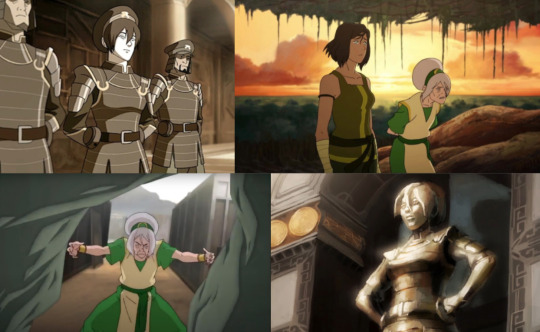
Assuming we have never watched ATLA before, what do we know about Toph based on LOK?
Previous Chief of Police in Republic City, founder of the first metalbending police force, founder of the first metalbending academy
Renowned for inventing metalbending, which is utilized for the development of modern technology and innovation in Republic City and the Earth Kingdom (particularly, Zaofu, is regarded as the safest city in the world due to it being made entirely out of metal)
To honor her metalbending achievements, there are several statues of her in Zaofu
Good friends with Avatar Aang, whom she affectionately named Twinkletoes, and was his earthbending teacher
Worked with Aang to arrest Yakone and was present at Yakone’s trial
Acted as a mentor to Korra, helping Korra face her fears and trained with her
Despite her old age and grumpy personality, Toph remained a strong fighter - easily able to beat Korra during training sessions, take down Kuvira’s sentries, and successfully break into Kuvira’s prison using her earthbending and metalbending abilities
States that her fighting days are over due to her old age, but has no problem fighting to save her family when they are captured by Kuvira (twice)
No interest in involving herself in current political problems in the Earth Kingdom, but will defend her family from political forces that threaten them
Strained relationship with her daughters (Suyin and Lin) because of how busy she was with her job, giving them too much freedom as she didn’t want to be as strict as her own parents
Covered up for Suyin’s crimes to save her reputation, leading her to retire early from guilt
Eventually repairs her relationship with her daughters - admitting she wasn’t a great mother but had great kids
Spent rest of her life living alone in a swamp, mentioning she has previous experiences with the visions it produces
High reputation in Republic City - has a statue of her built in front of police headquarters, Asami is impressed by her, Bolin calls her his hero
Aang
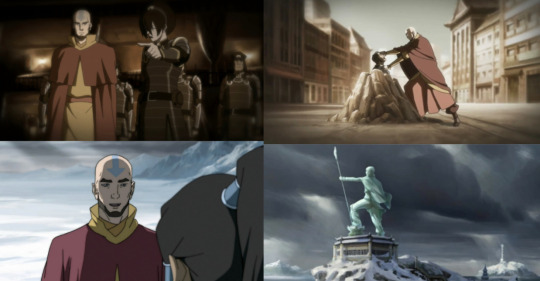
Assuming we have never watched ATLA before, what do we know about Aang based on LOK?
Previous Avatar before Korra, negotiated relations between people of all nations to keep peace and balance and served as the bridge between the Spirit World and natural world
Worked with his closest friend Zuko to transform the Fire Nation Colonies into the United Republic of Nations after the war
Lost his entire culture of Air Nomads to genocide during the hundred year war and was devastated - his greatest dream was frequently described as rebuilding the Air Nation and reviving Air Nomad culture
He began to do this by founding the Air Acolytes, who preserved the culture, practices, and teachings of the Air Nomads passed on from Aang
Placed all of his hopes and dreams for the future on Tenzin's shoulders, his only airbender son
Deeply connected to the Spirit World and was an esteemed spiritual leader, hoping his son would one day experience the same
Traveled the world with Tenzin so he could learn as much as possible, but was so focused on doing his duty to the world that he never had time for his other kids, Kya and Bumi, whom he had with his wife, Katara
Kya and Bumi felt like a disappointment to their father for not being airbenders and Bumi never felt connected to his father’s culture until he became an airbender later in life
Aang’s acolytes did not even know Aang had other children besides Tenzin
All of this seems to indicate Aang valued the ability to airbend the most in his children, leading to his waterbending/nonbending kids being neglected
Greatest flaw mentioned as his tendency to cut and run when things get tough
Despite all this, he was highly respected and admired by most characters in the show for all his achievements as Avatar and his wisdom
Assisted in the arrest of Yakone with Toph, a friend of his, and used energybending to remove Yakone’s bending
Gave Korra advice along with restoring her bending and bestowed upon her the ability to energybend
His grandkids (Meelo, Jinora, and Ikki) enjoyed hearing stories about his youth, such as his visit to Wan Shi Tong’s spirit library and his time with Guru Pathik at the Eastern Air Temple
Described as natural leader by Tenzin, sweet-tempered by Lin, and was good friends with Iroh
He built the air temple on Air Temple Island and in his honor, Aang Memorial Island was named after him and a statue of him was built
He’s so well-known and respected that there are even Aang-themed carnival games at the South Pole
Katara
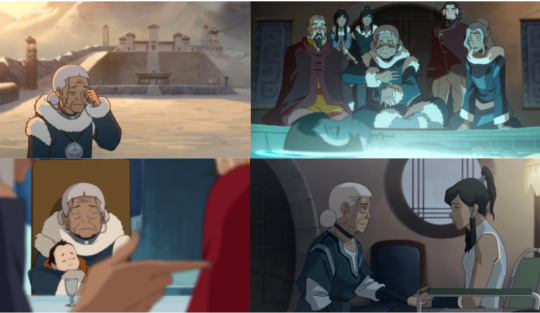
Assuming we have never watched ATLA before, what do we know about Katara based on LOK?
Described as the best healer in the world, responsible for teaching Korra how to heal, and mentioned to be a waterbending master
Monitored Korra’s avatar training and spoke to the Order of the White Lotus when Korra was ready to begin airbending training
Declared bloodbending illegal, but was not present for Yakone’s capture or trial
Attempted to restore Korra’s bending after Amon took it, but failed
Failed to heal Jinora when she was trapped in the Spirit World
Tries to guide Korra’s healing process after she is poisoned, but is unable to heal her on her own
Worked to heal the injured after Unalaq’s attack
According to Toph, Katara didn’t get involved in the civil war taking place in her homeland because of her old age
Mentions to Korra she knows what it’s like to go through a traumatic experience but doesn’t elaborate, instead describing Aang’s trauma
Married to Avatar Aang and had three kids - Tenzin, Kya, and Bumi - and three grandchildren - Ikki, Jinora, and Meelo
After Aang and her brother died, she was incredibly lonely, prompting Kya to move to the south pole to be with her. Misses her family that has passed away.
Her kids don’t visit her much, Meelo doesn’t even recognize his grandmother. She cries when Tenzin and his family leave.
Never speaks about her own life, but Jinora asks her once about what happened to Zuko’s mom, indicating they may have known each other.
By reading those summaries, it should be obvious just how differently Katara’s character was treated by the writers compared to the others. Katara’s legacy is reduced to simply being the “healer wife of the Avatar.”
And before anyone tries to twist my words: The problem is not that she is a mother, a wife, and a healer. The problem that is all she is ever allowed to be. Her entire identity revolves around:
Trying to heal people
Being the Avatar’s wife and occasionally offering random pieces of advice about what Aang would do (instead of, you know, giving advice based on her own experiences)
Missing her family
Again, none of these characteristics are inherently negative - the problem is how poorly they are written for Katara’s character. We are told things about her that just don't match up with what is shown in LOK canon. We're told that she’s a world renowned healer, but every time we see her use these abilities, she fails. We’re told that she’s the Avatar’s wife, but he was closest to his friend, Zuko. We’re told that she’s a mother who cares about her family, but we don’t know anything about her relationship with her children (and in fact, we know far more about her children's relationship with Aang).
Katara has no characteristics, no personality outside of her relationship to others - whether she’s acting as a healer, a mother, or a wife (this is some textbook misogynistic writing). She never speaks about herself, never mentions having any friends - only ever speaking about her husband, never describes her life before being a mother or a wife, is never shown to be honored or respected in the way the rest of the gaang is, has no political titles, and has only one post-atla accomplishment to her name. This is in contrast to Aang, Zuko, and Toph - all of whom have children but are never reduced solely to being a parent, all of whom are implied to be close friends, and all of whom have made multiple important contributions to the world of LOK. Even Sokka - who is barely in the show - is shown as having more achievements than Katara. I’m not sure how anyone could see this as doing Katara’s character justice.
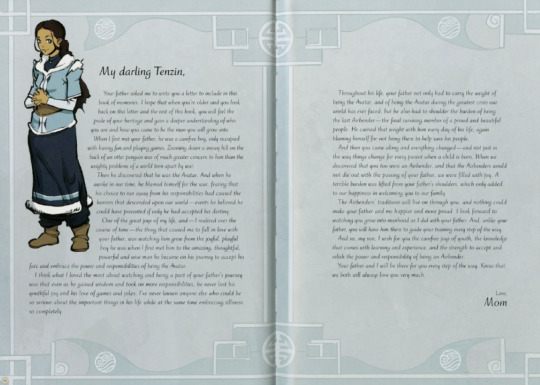
I want to end with this excerpt from the book Avatar: The Last Airbender: Legacy - while not from Legend of Korra, this letter written by Katara to her and Aang's son, Tenzin, is a perfect demonstration of Katara's poor characterization post-ATLA. Despite being written by Katara, this entire letter is about Aang. I'm honestly not sure why the writers didn't just have this letter written by Aang himself because there are no insights that Katara adds to it.
The letter starts with Katara saying that she hopes this letter will help Tenzin "feel the pride of [his] heritage and gain a deeper understanding of who [he is]." And yet this letter never discusses the fact that Tenzin is the son of a waterbender and an airbender, never discusses any of the lessons Katara has learned in her life or the hardships she's overcome, never mentions any part of water tribe culture, never even mentions her own brother or father or mother (family is important to Katara, but apparently the writers only think that her family with Aang matters). The letter is entirely about Aang's struggles and triumphs because post-ATLA Katara doesn't matter outside of her relationship to her husband and kids.
Part 2
#katara#katara analysis#atla#zutara#anti lok#lok critical#this is not shipping related at all but tagging zutara for visibility#pls show up in the tags tumblr i don't want to repost this a third time#my post#my meta
218 notes
·
View notes